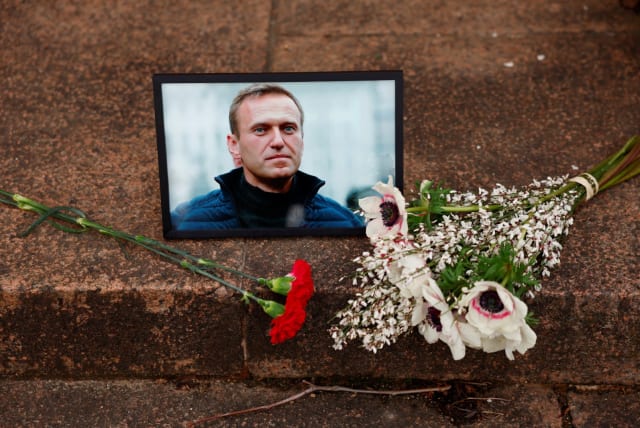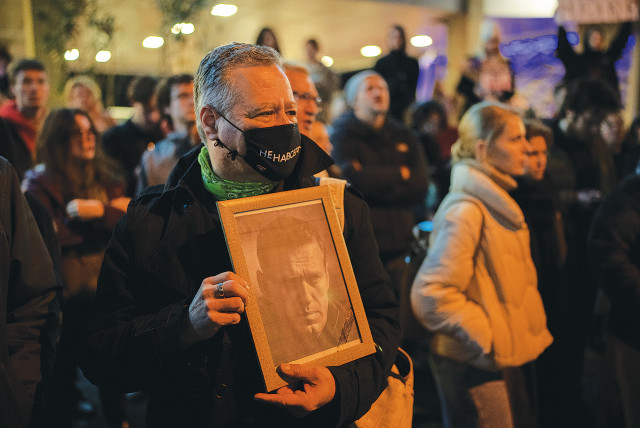Navalny to be buried on Friday, wife fears possible arrests

The Kremlin has denied state involvement in his death and has said it is unaware of any agreement to free Navalny prior to his death.
Russian opposition politician Alexei Navalny's funeral service and burial will take place in Moscow on Friday, his wife Yulia announced, but she said she was unsure if it would pass off peacefully or whether police would arrest attendees.
Kira Yarmysh, Navalny's spokesperson, posted on X that a service for Navalny would be held on Friday afternoon in the Church of the Icon of the Mother of God in the Moscow district of Maryino where Navalny used to live.
Navalny would then be buried at the Borisovskoye cemetery, which is located around 2.5 km (1.5 miles) away on the other side of the Moskva River. A Reuters reporter on Wednesday saw three police patrols at the snow-covered cemetery which is located near a busy road.
Navalny's allies have accused the Kremlin of thwarting their attempts to organize a bigger event a day earlier. The Kremlin has said it has nothing to do with such arrangements.
Russian funeral services are usually presided over by a priest and accompanied by choral singing, with attendees filing past the open casket of the deceased to say their farewell. The chosen Russian Orthodox church is an imposing five-domed white building in a suburb of southeastern Moscow.
It was not immediately clear how the authorities would ensure crowd control.
But judging from previous gatherings of Navalny supporters - whom the authorities have designated as U.S.-backed extremists - a heavy police presence is likely and the authorities will break up anything they deem to resemble a political demonstration under protest laws.
"The funeral will take place the day after tomorrow and I’m not sure yet whether it will be peaceful or whether police will arrest those who have come to say goodbye to my husband," Navalny's wife Yulia said in a speech to the European Parliament in Strasbourg, where she won multiple standing ovations.
Navalny, 47, died at an Arctic penal colony on February 16. His allies have accused President Vladimir Putin of having him murdered because the Russian leader could allegedly not tolerate the thought of Navalny being freed in a potential prisoner swap.
They have not published proof to back up that accusation, but have promised to set out how he was murdered and by whom.
The Kremlin has denied state involvement in his death and has said it is unaware of any agreement to free Navalny prior to his death.
Accusations
Navalny's death certificate, according to supporters, said he died of natural causes.
His mother last week accused the authorities of trying to blackmail her into holding a private funeral for her son by initially withholding his body, an assertion the Kremlin called absurd.
Yulia Navalnaya told the European lawmakers in Strasbourg: "Putin killed my husband."
"On his orders, Alexei was tortured for three years. He was starved in a tiny stone cell, cut off from the outside world and denied visits, phone calls and then even letters," she said.
"And then they killed him. Even after that they abused his body and abused his mother,"
In the 12 days since her husband's death, Navalnaya has staked a claim to take on the leadership of Russia's fragmented opposition, saying she will continue his work.
Speaking in English, her voice sometimes faltering, she described Putin as a "bloody monster" and told lawmakers it was not possible to negotiate with him.
"You cannot hurt Putin with another resolution or another set of sanctions that is no different from the previous ones," she said, calling for more effective action against the money flows of the ruling elite.
What was needed, she said, was a search for "mafia associates in your countries, for discreet lawyers and financiers who are helping Putin and his friends to hide money."
Funeral venue
Navalny's allies had been looking for a hall to accommodate his supporters at a farewell ceremony, but said they had been refused everywhere.
"Initially we planned the farewell and funeral for February 29th. It quickly became clear that there was not a single person who could dig a grave by the 29th of February," Ivan Zhdanov, a Navalny ally, wrote on X.
Feb. 29, Thursday, is the same day as Putin is due to deliver a speech to Russia's political elite and Zhdanov accused the authorities of not wanting Navalny's funeral to take place on the same day and overshadow it.
Zhdanov also accused the authorities of blocking attempts to secure a large hall for supporters to bid farewell to Navalny.
"Bastards. They won't give us the date we want. They won't give us the hall. Everyone will say goodbye to Alexei anyway," wrote Zhdanov, who is outside Russia.
Jerusalem Post Store
`; document.getElementById("linkPremium").innerHTML = cont; var divWithLink = document.getElementById("premium-link"); if (divWithLink !== null && divWithLink !== 'undefined') { divWithLink.style.border = "solid 1px #cb0f3e"; divWithLink.style.textAlign = "center"; divWithLink.style.marginBottom = "15px"; divWithLink.style.marginTop = "15px"; divWithLink.style.width = "100%"; divWithLink.style.backgroundColor = "#122952"; divWithLink.style.color = "#ffffff"; divWithLink.style.lineHeight = "1.5"; } } (function (v, i) { });

